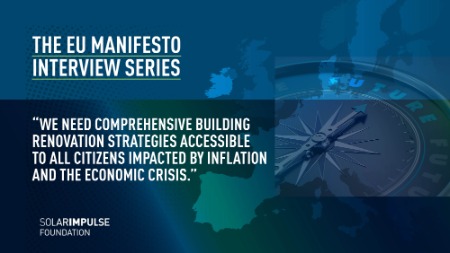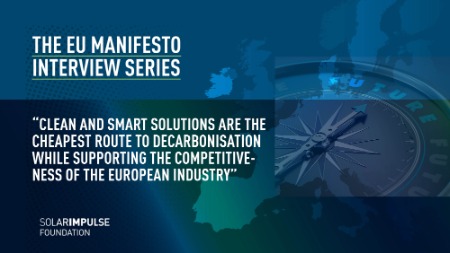News - June 6, 2024
"Water is still taken for granted"


Written by Alessandro Gaillard 2 min read
The EU Manifesto Interviews
In March, the Solar Impulse Foundation published its E.U Manifesto : Modernise to Thrive. The Manifesto, counting with the contribution of more than 40 stakeholders, is grounded in the steadfast belief that an efficient and resolute implementation of the Green Deal can and will come with multiple collateral benefits. On #WorldEnvironmentDay we sat down with Water Europe to discuss, you guessed it : Water, in the European Union's context.
Solar Impulse : Availability of clean water is a precondition for human life but is also crucial for industrial development. Has the topic of water received enough attention from policy-makers so far?
Durk Krol, Executive Directive of Water Europe : Water is still taken for granted and its socio-economic and environmental value is underestimated by many policymakers. So, clearly, the answer is no, it has not received enough attention. The World Resource Institute predicts a 56% gap between water supply and demand by 2030. It is why we are pleased with the initiative of the EU Economic and Social Committee. The EU Blue Deal is the first attempt from an EU institution to get a 360 degrees approach about water, from water uses and policy angles.
Water Europe stands for a Water-Smart Society in Europe. If we want to achieve water security, water resilience and water sustainability, we need to consider the holistic nature of water. All available water sources must be managed so that water scarcity and pollution are avoided; water and resource loops must be largely closed to foster a circular economy and optimal resource efficiency; the water system must be resilient against the impact of climate and demographic change; and all relevant stakeholders must be engaged in ensuring sustainable water governance.
Do we have enough information and data about the status of fresh water availability and sustainability limits of EU water reserves? In other words, are we sufficiently informed or should we investigate further?
Yes and no, I would say. Yes, because there has been progress in various sectors such as utilities, industrial actors, farmers, or local authorities in measuring and monitoring more and more the quality and flow of water across Europe. No, because there are still significant challenges in term of data collection and governance.
Moreover, Key strategic sectors for the EU have already been granted dedicated funds, whereas one of the main resources of their value chains has remained unconsidered: water. It is worth looking into concrete examples, including but not limited to these economic sectors:
Hydrogen: €130 billion of EU investments are directly associated with hydrogen projects, while the European hydrogen targets will require 90 million m3 of water as each kilogram of hydrogen requires 9 kg of ultrapure water (Eurowater).
Data Centre: €235 billion is dedicated to digital investment under the EU Budget 2021-2027, while a 1 MW data centre uses 25,5 million litres of water each year.
Semiconductors: €43 billion is invested for the European Chips Act, while the amount of water required per square centimetre of memory chip can reach 21 litres, which implies about 15,000 litres for a 300 mm wafer.
Agriculture: A kilogram of apples requires 700 litres while 1 KG of soybeans requires 1 800 litres.
What should be done to spotlight water and tackle the issues of water scarcity and quality the way it deserves?
For the next five years, we need to make water a stand-alone topic that is addressed in its full complexity. In our Manifesto for the European Elections in 2024, Water Europe calls for three key topics:
A Vice-president in charge of water.
A water strategy or action plan.
A Blue transition fund.
Water is a cross-sectoral topic, and the latest report of the EC on climate risks stressed it, once again. The nomination of an EU vice-president in charge of the whole dimension of water will enable Europe to strategically tackle the challenges that we are and will be facing, by breaking the current siloed approach and unlocking new opportunities for every sector.
A water-smart strategy is also needed here as water must be a priority for the next Commission with a clear action plan. It shall not be a new legislative wave but a way to put water at the core of our actions and strengthen our strategic autonomy by turning this resource into a competitive asset.
Lastly, a comprehensive approach of water challenges includes financial issues and ex ante investments in terms of CAPEX and OPEX for all economic sectors. By 2050, water scarcity could cause declines of up to 10% in GDP in many regions of the world, while their implementation would have a significant mitigating impact. In this regard, Europe is in a comparatively favourable position, since most of its countries would only need to invest 0.5% of their national GDP to deliver sustainable water management, while in other countries this can exceed 4% of GDP. For industry, up front action could save businesses more than five times the cost that stems from water-related risks according to the CDP.

Written by Alessandro Gaillard on June 6, 2024


